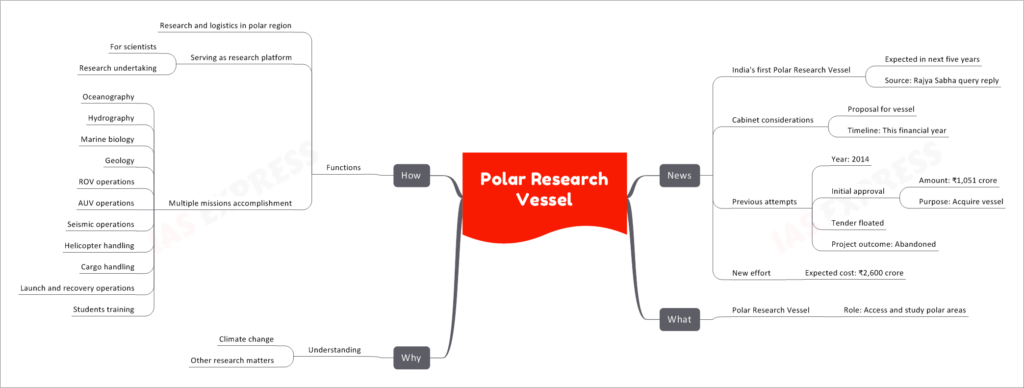Polar Research Vessel

India’s first Polar Research Vessel is expected to be ready within the next five years, marking a significant step forward for the nation’s scientific exploration capabilities.
This topic of “Polar Research Vessel” is important from the perspective of the UPSC IAS Examination, which falls under General Studies Portion.
India’s First Polar Research Vessel
The Polar Research Vessel is a specialized ship designed to access and study the polar regions. It will serve as a critical tool for scientists to gain deeper insights into various aspects of polar environments and contribute to important research on climate change and other related matters.
Previous Attempts and the New Effort
India’s journey towards acquiring a Polar Research Vessel began back in 2014 when an initial approval was granted, allocating ₹1,051 crore for the purpose. However, the project faced challenges and was eventually abandoned after floating a tender. Undeterred, the country is now making a renewed effort with an expected budget of ₹2,600 crore to bring this ambitious project to fruition.
The Importance of a Polar Research Vessel
Understanding Climate Change
The polar regions play a crucial role in the global climate system. The research vessel will enable scientists to gather data on melting ice, temperature changes, and ocean currents, leading to a better understanding of climate change and its impact on the planet.
Exploring Other Research Matters
Beyond climate change, polar regions are home to diverse ecosystems and unique geological features. The vessel will facilitate research in fields such as oceanography, hydrography, marine biology, geology, and more, contributing to broader scientific knowledge.
Functions of the Polar Research Vessel
The Polar Research Vessel will be equipped with a wide range of capabilities, making it a versatile research platform.
Research and Logistics in Polar Regions
One of the primary functions of the vessel is to support scientific research missions in the harsh and challenging polar environments. It will serve as a mobile laboratory, allowing scientists to conduct experiments and collect samples directly from the polar regions.
Accommodating Scientists and Research Undertakings
The vessel will provide state-of-the-art facilities and accommodations for scientists on board, ensuring they can perform their research tasks effectively. It will serve as a hub for various research undertakings and projects, fostering collaboration among scientists from different disciplines.
Accomplishing Multiple Missions
The Polar Research Vessel will be capable of executing various missions, including:
- Oceanography: Studying the ocean and its physical properties, currents, and marine life.
- Hydrography: Mapping and studying the underwater topography and features.
- Marine Biology: Investigating marine ecosystems and their inhabitants.
- Geology: Studying the geological formations and processes in polar regions.
- ROV Operations: Deploying remotely operated vehicles for underwater exploration.
- AUV Operations: Utilizing autonomous underwater vehicles for data collection.
- Seismic Operations: Conducting seismic surveys to understand Earth’s structure.
- Helicopter Handling: Enabling access to remote locations via helicopters.
- Cargo Handling: Transporting equipment and supplies for research missions.
- Launch and Recovery Operations: Deploying and retrieving research equipment.
- Students Training: Providing opportunities for aspiring researchers to gain hands-on experience.

